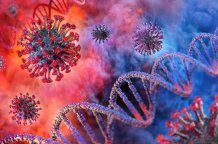
This test could help healthcare workers and others know when they are safe from COVID-19 to return to work.
A new test which could detect whether people who have had COVID-19 are still infectious is under development, thanks to funding from Animal Free Research UK.
The charity is providing funding of £52,000 to Professor Lorna Harries at the University of Exeter, who is developing a test that will aim to detect how much active virus an infected person is harbouring – known as viral load. Unlike current tests, which do not separately measure the inactive (non-infectious) and the active parts of the virus, the team is refining a test that could tell users not only whether they are carrying active virus, but also how much. This could help healthcare workers and others know when they are safe to return to work.
Professor Harries, who leads the Animal Free Research UK Animal Replacement Centre of Excellence (ARC 2.0) at the University of Exeter, said: "Currently, people with COVID-19 can recover completely, yet still test positive. That's because the tests detect any genetic material left over by the virus after it is inactivated by the immune system. If successful, this new test will specifically look for active virus, and tell us how much of it is present. It would be incredibly useful in helping people safely to return to frontline duties, or patients return to care homes."
The test will analyse the genetic material sub-genomic RNA, which is only present if the virus is active and the patient is potentially infectious. It is an adaptation of a test which recently featured in the journal Nature, which was developed to determine where in the body the virus was most concentrated.
The virus appears to pose a greater threat to people who are regularly exposed, such as frontline healthcare workers. In future, researchers hope to develop a mathematical model to combine with the test to be able to develop a more personalised approach to predicting which patients are at risk of complications from COVID-19. The calculation will be based on factors such as their age and health histories, combined with the concentration of virus in their bodies.
Professor Neil Gow, Deputy Vice-Chancellor for Research and Impact at the University of Exeter, said: "It's really exciting that this test has the potential provide a much-needed service in the fight against COVID-19, and that its development is possible without using animals. We're committed to innovative ways of reducing the use of animals in research. This commitment is in line with our ethos, governance principles and the legal framework that we deploy that insists on the highest ethical standards in all of our research involving animals. This research conforms to, and is underpinned by, stringent Home Office-approved licences and monitoring. We're proud that we ensure and enforce the highest standards of animal care and welfare, and we're committed to the principle of 3Rs – which is to replace, reduce or refine the use of animals in research wherever possible".
Carla Owen, Chief Executive of Animal Free Research UK, said: "I'm proud that we at Animal Free Research UK are doing our bit to support the COVID-19 effort by funding important research into a more effective, animal-free diagnostic test. This devastating virus is bringing out the best of humanity's collective genius, ramping up novel ways of understanding, testing and treating human disease using human relevant research without the use of animals. We believe Prof Harries' test will ensure healthcare workers can get back to their vital jobs, protect the NHS, and save animal and human lives."






